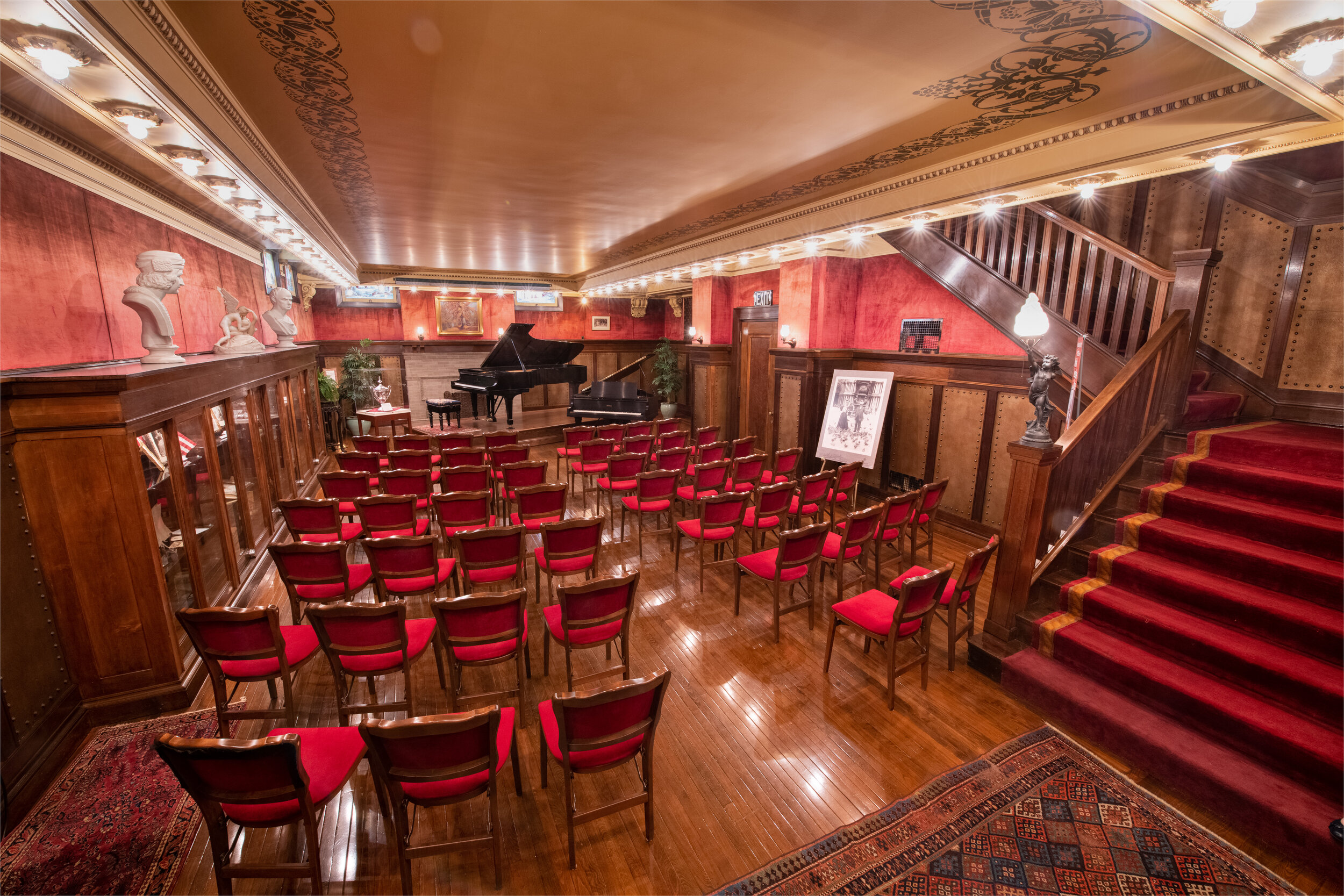Notes From the Piano (pt. 4)
While the big things may seem obvious, such as finding the judges and vetting the entrants, there are a myriad of tiny details that can easily be overlooked. Things like tuning the pianos before the finals, setting up seating arrangements so that everyone from the audience to the judges can see the players actually performing, and reserving rehearsal facilities for the finalists.
Ruthmere’s Game Room and our two pianos, the Steinway (once Arthur Rubenstein’s practice piano) and the Baldwin (donated to us by the Deputy family, who was the last family to live at Ruthmere).
Because Ruthmere only has two functioning pianos—both in the Game Room where the finals take place—we effectively do not have any rehearsal space for the finalists, most of whom prefer to get an hour or so in immediately before they compete. As a result, we have to scout around for practice space. Fortunately, our next-door neighbor, The First Presbyterian Church, happens to have two very handsome pianos in their building. The pairing seemed obvious.
First Presbyterian Church, 200 E Beardsley Ave, Elkhart, IN 46514
From the very first year, Ruthmere struck up a musical relationship with the church. Of course, we’ve been doing business with them for many years, renting their parking lot for our visitors to use. But this was something unique. Here we were actually requesting permission for our finalists to spend time inside their building. Timing was an issue right from the get-go, but luck seems always to have been on our side. Until 2020, at least.
I spoke with the reverend for the first time in 2018 to make the arrangements. I wanted to reserve both pianos so that we could have two finalists practice at a time on the day of the finals. I guess I should have come forward sooner because she informed me that they might have a wedding planned for that day. As luck would have it, the betrothed couple chose to have their ceremony one week earlier, clearing the way for us. Since then I have made a point of booking the pianos well in advance—February 15, in fact, this year. This way the church can work their schedule accordingly.
Of course, nothing ever goes as planned, so they say. Last year was proof of that. COVID-19 restrictions forced First Presbyterian to close its doors to the public, including our finalists. That meant we had no rehearsal facilities to offer our musicians. I wasn’t too worried about this. Having viewed their entry videos, I knew each of them was a genius at the keyboard and that one extra hour was unlikely to make any difference to their ability to perform. And in that respect I was right. They all came through with flying colors.
But enough about rehearsals. There are many more aspects to putting on the competition than just the music. What happens when real disaster strikes? For anyone who saw The Competition, the movie I referenced in my first blog entry, you’ll recall that Amy Irving was attacked by a dying piano shortly after beginning her final performance. Rather than falling to pieces, she stood up proudly, announced she would be back, and proceeded to demand another piano. OK, we do have a second piano in the Game Room, should the need ever arise. Fortunately, that has not happened yet.
2020’s winner, Hyeseon Jin, performing on the Steinway
To be on the safe side, however, we do have both the Steinway and the Baldwin tuned up the day of (or the day before) the competition. For the first year, we even had a technician from Chupp’s Pianos on hand in case the unthinkable should occur. I think we feel a little more at ease now. So many musicians have praised our Steinway as one of the best instruments they’ve ever played that we feel the utmost confidence in its ability to outlast six sets of fiery fingers.
Then there’s food for the reception afterwards, help shuttling the finalists to the church to rehearse and then back again in time to perform. (They—nor I—never know the order in which they will play until the evening before the finals, which adds an extra soupçon of tension and excitement.) The list goes on and on, as do my thanks to the people who get these tasks done. You know who you are. For all my hands-on-ness (yes, I know that’s not a word—roll with it!), I cannot do it alone.



